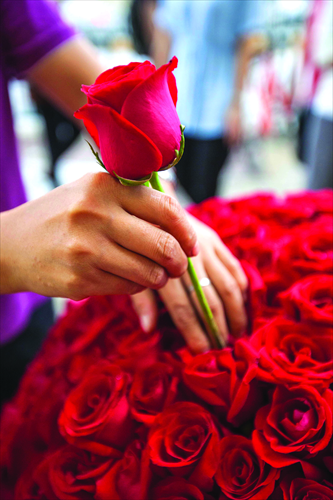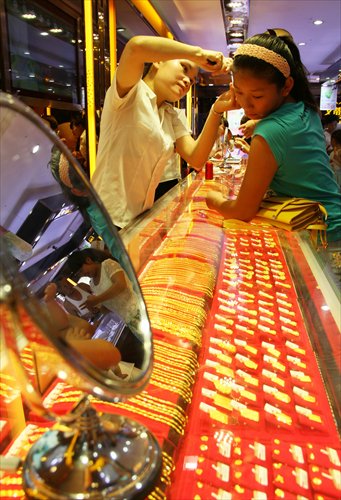The cost of love
Traditional festival for sweethearts now all about dollars, but where’s the sense?

Sales for roses and other floral bouquets have hiked in the lead-up to Qixi Festival, or "Chinese Valentine's Day," as it is commonly known in the West. Photo: CFP
According to the Chinese Lunar Almanac, tomorrow is the seventh day of the seventh month. It is the day on which Chinese traditionally observe Qixi Festival, popularly known in the West as "Chinese Valentine's Day."
In the Chinese folktale from which the festival takes its meaning, a humble cowherd (Niulang) falls in love with a weaver girl (Zhinü), who unbeknownst to him, is in fact the daughter of the king of heaven. The king of heaven quite understandably objects to the match, given that the cowherd has nary a possession to his name, not to mention the fact that the cowherd is a mere mortal, and the weaver girl, a goddess.
The king of heaven whisks his daughter away, and to ensure that there are no further shenanigans, draws a river in the skies that cannot be traversed, separating the two forever. But Zhinü's mother, moved with pity, decides to permit the lovers to be together once each year, on the seventh day of the seventh month, by building a bridge of magpies.
Traditionally, the festivities that take place on Qixi have celebrated a woman's assiduousness and graft, with games and competitions around needlework an especially popular custom. But in recent years, the festival has gone the way of its Western namesake. Today, couples young and old are expected to use the occasion to make amorous declarations to one other, usually in the form of lavish gifts and displays of affection, the more expensive the better.
The festival has become a red-letter day for a whole range of businesses, from cosmetic and fashion brands to electronics stores and online malls, each offering special Qixi discounts and promotions in the hope of cashing in on the cost of love.
It's all about the money, money, money
Yang Bingyang, a popular blogger and the author of a number of books giving relationship counsel, believes that the Qixi Festival is only propaganda of the market.
"Businesses have capitalized the opportunity afforded by the festival to make people spend money," said Yang. "It has completely lost touch with origins. The festival as it is celebrated today is just the fabrication of businessmen," said Yang.
A quick look at the market bears out her claims.
Taobao, China's largest online retailing platform, reported that sales of items and gifts considered to be "romantic" have grown every year for the past few years. On such novelty gift, a fold-out bed for installing inside a car, has had some 280,000 page views between July 23 and 29, tripling its views from the previous week. Sales of the bed also doubled over the same period. On Tmall, a business-to-consumer subsidiary of e-commerce giant Alibaba, 2.6 million flowers were sold between July 24 and 29, which is equal to the sales volume of 200,000 medium-sized flower shops over a regular three day period.
The trend towards excessive spending leading up to Qixi does not only apply to relatively modest goods bought online. According to a Beijing Evening News report, the week leading up to last year's festival was one of the peak sales weeks for diamonds over the business year. Jewelry retailer Caibai sold 4 million yuan ($0.6 million) worth of diamond-based trinkets and accessories in the final weekend before the festival alone.
"In the first instance, the tale of the cowherd and the weaver girl was meant as a reminder for people to cherish what they have - in particular their spouse, their family, and their loved ones," said Gao Wei, the secretary-general of the Beijing Folklore Society.
"Has it become too commercial? Well, I suppose it can't be helped, it's the way things are trending. Christmas is also a purely commercial holiday these days. Modern culture is all about entertainment and consumption."
From a relationship perspective, Yang considers that how a couple treats each other in their daily lives as being far more important than lavishing one's significant other with exorbitant gifts once every year.
"You need to make persistent endeavors. Rather than the number on the price-tag, it's the time and patience someone puts into a relationship that really matters," she said.



With vendors seeing Qixi as an opportunity to cash in, the traditional Chinese festival has lost much of its original meaning. Photos: CFP, IC
Case study: the princess and the pauper
As a poor college student at Beijing Union University, 19-year-old Yang Chen's options are rather limited when it comes to celebrating Qixi. He expects to have only around 200 yuan to spend.
Yang plans to take his girlfriend somewhere like Yuyuantan Park, the place where the first blush of infatuation between he and his girlfriend bloomed. They will have dinner somewhere affordable nearby, after which Yang hopes to enjoy a stroll with his beloved through the neighborhood streets lined with cafés and boutiques.
"Dinner, flowers and a small present," said Yang, with a concision belying his basic means.
Yang does not feel the pressure to spend more, instead he prefers to see the occasion simply as an opportunity to spend time with his girlfriend. But he readily admits that his options are scarce given his meager means.
"I'm not sure what else I could do," Yang said.
While Yang has his hands tied by his lack of funds, those who possess greater economic means are sparing no expense.
Jiang Jing, 23, who works in the finance industry, has booked flights to Hainan Province for Qixi celebrations with her husband. Luxury hotels, fine dining restaurants offering seafood banquets, and a whole medley of other activities including deep-sea diving have been meticulously deliberated over and arranged.
Jiang estimates that the entire trip will cost around 30,000 yuan.
"My husband and I don't usually have the chance to spend a lot of time together. But this year, Qixi happens to fall on the weekend, so we're able to take a short trip," said Jiang. "Hainan is known as a place for lovers."
Jiang said that she doesn't care about how much the trip will cost, as long as they are able to do all the things they want to.
"My husband never properly proposed to me, so this will be a romantic way of making up for it," she said.
From the eyes of laowai
"I think it's a great excuse to enjoy some time off together, but it seems to me that nobody cares about the origin of the festival," said Alec Ash, a British journalist and author who has been living in Beijing since 2008.
Ash has a Chinese girlfriend, and plans to celebrate Qixi with her this year.
"I'll probably celebrate it according to the Western traditions on Valentine's Day, like buying her flowers and having a special dinner. I don't know how the Chinese celebrate it," said Ash.
"Actually, I don't know whether modern Chinese people are even celebrating [the traditional festival] or not."
Though Ash sees the festival as an opportunity to share a romantic moment with the object of one's affections as well as to show one's appreciation for their amorous other, he does not think it especially important to have to spend money on one's beloved.
"[For me], walking down the hutong or riding a bike with her sitting behind me is the romantic [part of living in] Beijing," he said.
"It doesn't matter how much you spend. It's the attention and preparation that matters."
Andrea Hriscu, a 29-year-old Romanian architect who has been living in Beijing for roughly two years, does not have anything elaborate planned for spending Qixi with her Chinese boyfriend.
"It could be cheap, but still special. It's not about money. He can bring you a flower, or find a special place or activity, or just be romantic in his own way," she said.
With the mass commercialization of Qixi, Ash does not see any difference in practice between Western Valentines Day and the traditional Chinese festival.
"Two Valentine's Days in a year?" Ash said, laughing. "That's too much!"
The price of love: how to celebrate Qixi
0 yuan: volunteer-date at a charity
Nothing says "marriage material" more than volunteering at the local animal rescue shelter, orphanage, or old people home. Possible options include animal welfare organization Beijing Adoption Days (weibo.com/p/1006061658447413) or the Migrant Children's Foundation (mcfchina.org).
0 to 100 yuan: re-enact your favorite rom-com
Take your reluctant other to the place where the scene from your favorite romantic-comedy was filmed. Suggestions for the lazy: the Oriental Plaza on Chang'an Avenue (Love is not Blind), and SOLANA in Chaoyang district (Beijing Love Story).
100-500 yuan: star-crossed lovers
Find a secluded spot, bring camping supplies, and spend the night gazing at the starry summer night while regaling your loved one with the tale of the cowherd and the weaver girl. Recommended locations include Olympic Forest Park and Bashang Grassland in Hebei Province.
500-1,000 yuan: wining and dining
Follow the old romantic adage that the way to one's heart is through his or her stomach, treat your loved one to a meal they won't soon forget. The Hilton Beijing (5865-5030) is holding a special banquet for the occasion. For contemporary European cuisine, one won't go amiss with Temple Restaurant Beijing (8400-2232).
1,000 yuan upwards: the story of a lifetime
Book an entire private theater to show him the romantic home-movie you've secretly been making; whisk her away to Ibiza or Panama; in short, just throw money at him or her.
Jessica Li contributed to this story.